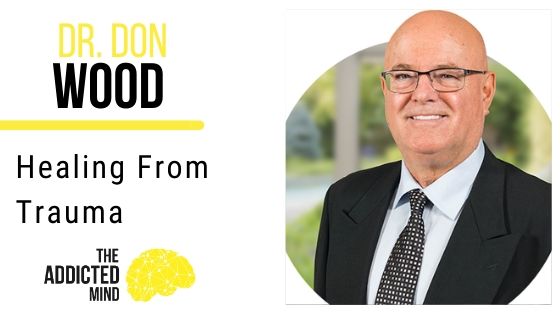Today’s guest is Dr. Don Wood, from the Inspired Performance Institute, and he will be talking to us about trauma and how to heal from it. Don helps people reprocess their trauma so that they’re no longer in a state of hyper-vigilance and responding to their past trauma in the present moment.
Our traumas can either take us down or inspire us. Don believes that every individual who is dealing with addiction has had trauma. He has been very successful in treating addiction as well as trauma. In the past, he used to find that people were finding ways to live with trauma by learning how to manage it and cope with its effects. Trauma, however, creates glitches and error messages in the way that our minds work and so Don has subsequently discovered that it is possible to eliminate trauma so that we no longer need to deal with any of its effects.
Self-help books tell us to stay present and be in the moment, but our minds don’t work that way. Once we understand how our minds work, we become able to create the necessary solutions to get our minds to remain in the present moment.
Our subconscious mind operates in the present, so ninety-five percent of our brain is always present, just like the mind of an animal is always present. But because our minds experience trauma on a looping basis, we can’t shut off the loop of information, and so we continue to re-experience the past trauma in the present moment.
Our traumatic events and experiences are recorded in our memories differently from our regular experiences. Experiences that are neither threatening nor disturbing are recorded and stored in memory as fairly low-resolution files. Threatening or disturbing experiences, however, are recorded and stored differently by the mind. Our senses are heightened and intensified with those experiences, so they are stored in our minds in high definition. And this is where the glitch comes in.
If our mind goes back into memory, and it sees the stored images of those traumatic events, it perceives those events to be happening right now, in the present moment. So although there is nothing threatening happening in the present moment, the mind still creates a response to the memory of the threat.
With people who have experienced trauma and a constant sense of fear or anger, along with the emotional dysregulation of the nervous system, the normal reaction of the mind is to want to escape the threat, or to attack it. In other words, the high-resolution data is constantly being activated, and that creates a physiological fight-or-flight response. So although the fight-or-flight response is an emergency management system, designed to protect us, for most people, it has become an operating system that is on all the time.
Your mind will do anything to try to protect you and avoid pain. So at the Inspired Performance Institute, they start with the premise that there’s nothing wrong with anybody, or with anybody’s mind. They understand that our minds are being affected by events and experiences throughout our lifetime. And this is constantly activating our nervous systems. So, if you have high-resolution data stored, and your mind is activating it, you will create a response. And the response could be to take a drink or to use a drug.
We have a second memory system, called Procedural Memory, which is based on the basal ganglia learning how to adapt to their environment. By doing something over and over, you train your brain to build a code to protect you in the same way as an animal mind would.
Don believes that what is happening with addiction is that people who have had emotional pain from trauma and have repeatedly used a certain resource to stop the pain, have built code in their nervous system that their mind keeps using to keep the pain away. Yet the code is an error message, so it keeps looping and the erroneous danger response remains active.
There can be both high-level and low-level traumas.
Sometimes, people have lived with trauma all their lives, so they think that the hyper-vigilance that they are experiencing is normal. If you feel emotion when thinking about something that happened to you as a child, it means that the trauma is still active. By using a process to resolve the trauma, you can de-activate it and then your mind will start seeing things differently.
To fix things, the mind needs to stop looping. At the Inspired Performance Institute, they have developed a series of techniques to reduce and eliminate PTSD, panic attacks, and anxiety attacks in a four-hour session. They do this by providing a counter-frequency for the memory. Then, the mind takes on the new frequency and changes it to the lower state. After that, the mind stops responding to the previously traumatic memory.
People are often shocked at how fast the trauma has been eliminated!
The mind and body are designed to heal. All you need are the tools to do it with.
Links and resources:
If you need help or some support, reach out to us at www.theaddictedmind.com/help
The Inspired Performance Institute – https://www.inspiredperformanceinstitute.com/
To get the first chapter of Don’s book, You Must Be Out of Your Mind, or to contact Don, go to https://www.inspiredperformanceinstitute.com/

